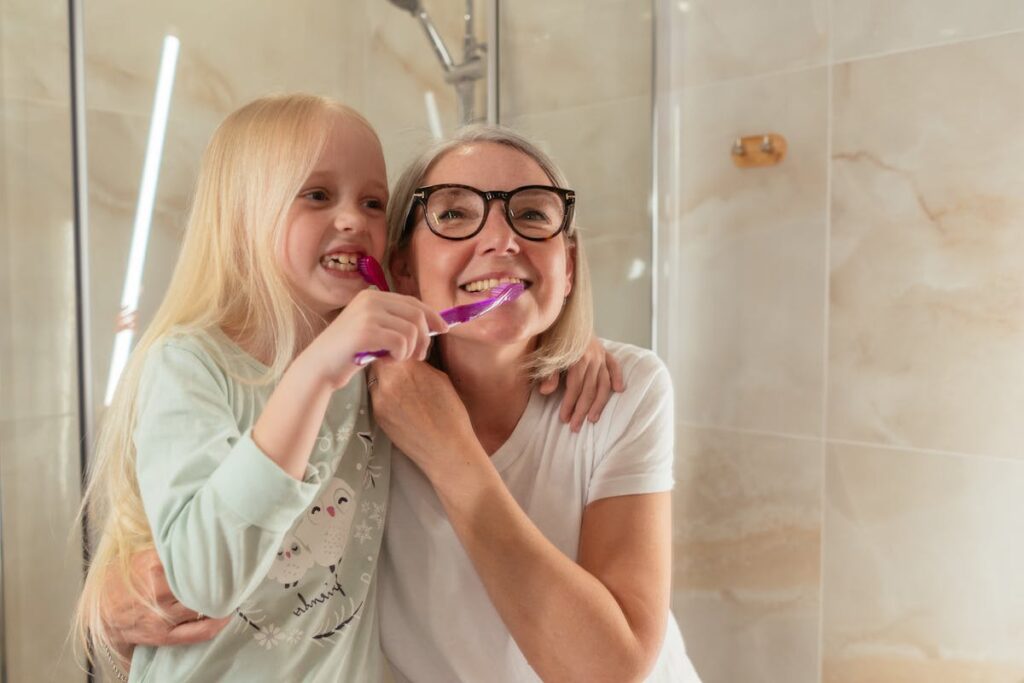While many oral health issues are common to both genders, there are some at various stages of our lives which affect girls and women specifically.
These problems could be related to certain medications, hormones or possibly even due to unexplained reasons. Here are some issues affecting some specific stages of life.
Tweens, teens and young adults
These are some oral health issues young to mid-life-aged women need to be aware of:
Sore mouth prior to menstruation
Some girls and women with poor oral hygiene can experience increased mouth soreness, or redness and bleeding of the gums when brushing their teeth, a few days before their period starts.
This is associated with changes in hormone levels, in particular oestrogen and progesterone, and is less common in women with healthy gums. However, women with pre-existing inflammation of the gums can experience an exaggerated effect due to the hormonal fluctuations associated with menstruation. Regular oral hygiene including twice daily brushing and daily cleaning between the teeth should resolve this.
Gingivitis
Changes in hormone levels may predispose some females to gingivitis. This is more pronounced if oral hygiene is not as good as it could be. Signs include swollen or puffy gums, or gums that become darker red in colour and bleed more easily. The sufferer may also get bad breath.
The increase in hormone levels associated with these symptoms will return to lower levels once the period ends. It’s also worth mentioning that despite the old wives’ tale, menstruation in itself is not a reason to delay dental treatment, particularly emergency dental treatment.
Menopausal and post-menopausal
Menopause doesn’t just give you hot flushes and mood swings. Around 60 per cent of menopausal women also experience these oral conditions:
Dry mouth
These include a sensation of oral dryness and burning, difficulty articulating words and swallowing/eating dry foods like crackers, crisps and bread. It’s normally related to medications such as antidepressants, antihistamines and blood pressure drugs.
The risk of dry mouth also increases as the number of medications taken increases. If the woman stops or reduces the amount of that medication, the condition can go away—though this should only be done with close medical/dental supervision.
Dry mouth can increase the risk of oral infections such as thrush. It can also lead to an increased risk of tooth decay. This is because saliva helps to protect the teeth and neutralise acids produced by bacteria in dental plaque.
Try taking frequent sips of water. You may also use over-the-counter dry mouth products and oral lubricant sprays and gels. Chewing sugar-free gum can also help stimulate saliva. Avoid or limit caffeine intake. There are also specialised dry mouth toothpastes and mouth rinses which may help.
Oral discomfort and burning
This mainly affects women in their 40s and 50s. It’s characterised by oral discomfort and a burning sensation affecting the inside of the cheeks, tongue, gums, lips, palate and sometimes throat. No-one knows exactly what causes burning mouth syndrome, though there seems to be a correlation with menopause or anxiety/depression.
Dentists do recommend that haematinic (iron, vitamin B12, folate) deficiencies should be excluded as a cause. This means you may need to get a blood test to confirm this. Sometimes the condition resolves itself spontaneously without medical intervention. In other cases, it can become chronic and ongoing medication is needed.
Gum disease
Hormonal changes increase the likelihood of developing gum disease, known as gingivitis in its milder form. Symptoms include bleeding of the gums when brushing, changes in the appearance of the gums (redness, puffiness or gums shrinking away from the teeth in places), bad breath or loose teeth.
It’s typically managed by meticulous oral hygiene including flossing daily, brushing the teeth for two minutes twice a day and regular dental visits. Sufferers also need to be vigilant about sugar intake as this always compromises oral hygiene. There are conflicting results regarding the effect HRT has on gum disease—in some women there are improvements and in others, no change.
The good news is that gum disease will definitely improve with regular careful oral hygiene at home and reviews with your dentist or oral medicine specialist. It can be controlled and the damage halted—though existing damage cannot be reversed. If allowed to worsen, it turns into periodontitis which needs intervention from a periodontist.
Osteoporosis medication-related complications
Women in this age group commonly develop osteoporosis and are prescribed specific medication to manage this. Some of these medications can impact a woman’s jaw, with pain in affected areas, gum swelling and pus. In severe cases, patients are at risk of jawbone fracture.
Such complications often occur following an oral surgical procedure such as a tooth extraction or implant placement, although it can occur after trauma to the oral tissues, or even spontaneously. Usually it presents with an area of exposed, non-healing jawbone, which may become infected.
The key is prevention: comprehensive dental assessment before starting medication for osteoporosis, meticulous oral hygiene and regular dental visits.

Pregnant women
The mouth is an often overlooked and neglected area of a woman’s health during pregnancy when the majority of medical attention is centred elsewhere.
Yet oral health plays a significant role in maintaining the health of the mother and the unborn baby. For example, maternal periodontal disease can potentially contribute to the risk of adverse pregnancy outcomes including pre-term birth and low birth weight babies.
For women who are pregnant and experiencing dental pain, it’s important to seek the advice of a dentist immediately. Don’t leave this until after the pregnancy is over as the condition could worsen and affect both the mother’s health and that of the unborn baby.
Almost all dental procedures are safe during pregnancy, though elective surgical procedures such as implants may be best deferred. Local anaesthetics used in modern dentistry are safe to use during pregnancy and whilst breastfeeding, so treatment should not be avoided for this reason.
While routine x-rays should preferably be taken before the pregnancy, latest advice from the Australian Radiation Protection and Nuclear Safety Agency states that there’s no reason to avoid x-rays for conditions like toothache during pregnancy, with a lead apron used for certain situations. Failure to detect and properly treat a dental problem poses a greater risk than the x-ray itself.
Gum disease or gingivitis
During pregnancy, hormonal changes take place which make the gums more sensitive to irritation from the germs and bacteria in the mouth. This can sometimes make the gums very red and swollen. They may also bleed when brushing and flossing.
If you experience these problems, make sure you keep your teeth and gums clean by brushing gently twice a day and flossing once a day. Any bleeding from the gums that doesn’t lessen with regular brushing and flossing should be checked by a dentist who may recommend professional dental cleaning.
Pyogenic granulomas
These are red, lumpy lesions along the gum line and between teeth, and can crop up due to pregnancy hormones. These lesions generally stabilise or shrink naturally following pregnancy. However, some may need to be removed after the baby is born.
Morning sickness
If you experience vomiting and reflux, the low pH of the stomach acids can weaken the tooth enamel. Over time, it can lead to tooth erosion or wearing away of the tooth’s surface. This damage can be minimised by not brushing the teeth straight away. Instead rinse with water (preferably fluoridated tap water) straight after being sick. Wait about an hour before brushing. In the meantime, to make the mouth feel fresher, smear a little toothpaste on the teeth.
The bottom line for great oral health
Remember, no matter how old you are, you need to maintain oral hygiene basics: brush twice a day, floss daily, eat a diet low in sugar and see your dentist regularly. Dentists are trained to be aware of signs of disease and issues that can impact female patients.
Read next: Why baby teeth are important
How helpful was this article?
Click on a star to rate it!
0 / 5. 0
Be the first to rate this post!
Australian Dental Association
Related posts
Subscribe
Receive personalised articles from experts and wellness inspiration weekly!

